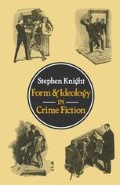Abstract
Since the Second World War a new pattern has emerged in crime fiction, indicating by its wide success and many versions that it ratifies new attitudes to crime-control. The detective has become a policeman, acting with institutional support, conducting more or less accurately reported police business. Earlier police heroes merely professionalised the romantic pattern of a surpassing individual, and even relatively realistic writers like Crofts and Simenon gave special qualities of patience and insight to individualistic heroes. A democratic and factual pattern did exist in the thirties, but British novelists like Maurice Procter and ‘Henry Wade’ hardly claimed a large audience and the relative realism of Hammett and the Hollywood police films of the late thirties are still highly melodramatic and hero-centred. The ‘police story’ only emerged as a specific element in a new ‘structure of feeling’ after the war, when successful professional authors exploited the pattern and especially when it was given authoritative shape in radio and television.
Access this chapter
Tax calculation will be finalised at checkout
Purchases are for personal use only
Preview
Unable to display preview. Download preview PDF.
References
Texts
Cop Hater, Penguin, London, 1963
The Mugger, Penguin, London, 1963
The Pusher, Penguin, London, 1963
he Con Man, Penguin, London, 1963
Criticism
John Creasey’s comment is in the introduction to Gideon’s Week, Hodder &
Stoughton, London, 1956, the second novel in the series.
Daniel Bell, The End of Ideology, 2nd rev. edn., Collier, New York, 1962.
Arthur Brittan, The Privatised World, Routledge and Kegan Paul, London, 1978.
Angus Calder, The People’s War, Cape, London, 1969.
Jean Duvignaud, The Sociology of Art, Granada, London, 1972.
Fredric Jameson, Marxism and Form, Princeton University Press, Princeton, 1971.
James McClure, ‘Carella of the 87th’, in Murder Ink: The Mystery Reader’s Companion, Workman, New York, 1977.
Karl Marx, Capital, Progress Publishers, Moscow, 1957.
C. Wright Mills, ‘The New Left’, New Left Review, 5, 1960, reprinted in Power, Politics and People, Oxford University Press, New York, 1963.
D. and J. Wilier, Systematic Empiricism: Critique of a Pseudo-Science, Prentice-Hall, Englewood Cliffs, 1973.
Eli Zaretsky, Capitalism, the Family, and Personal Life, Pluto Press, London, 1976.
Copyright information
© 1980 Stephen Knight
About this chapter
Cite this chapter
Knight, S. (1980). ‘… a deceptive coolness’— Ed McBain’s Police Novels. In: Form and Ideology in Crime Fiction. Palgrave Macmillan, London. https://doi.org/10.1007/978-1-349-05458-9_7
Download citation
DOI: https://doi.org/10.1007/978-1-349-05458-9_7
Publisher Name: Palgrave Macmillan, London
Print ISBN: 978-1-349-05460-2
Online ISBN: 978-1-349-05458-9
eBook Packages: Palgrave Literature & Performing Arts CollectionLiterature, Cultural and Media Studies (R0)

